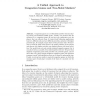Free Online Productivity Tools
i2Speak
i2Symbol
i2OCR
iTex2Img
iWeb2Print
iWeb2Shot
i2Type
iPdf2Split
iPdf2Merge
i2Bopomofo
i2Arabic
i2Style
i2Image
i2PDF
iLatex2Rtf
Sci2ools
IM
2008
2008
A Unified Approach to Congestion Games and Two-Sided Markets
Abstract. Congestion games are a well-studied model for resource sharing among uncoordinated selfish agents. Usually, one assumes that the resources in a congestion game do not have any preferences over the players that can allocate them. In typical load balancing applications, however, different jobs can have different priorities, and jobs with higher priorities get, for example, larger shares of the processor time. We introduce a model in which each resource can assign priorities to the players and players with higher priorities can displace players with lower priorities. Our model does not only extend standard congestion games, but it can also be seen as a model of two-sided markets with ties. We prove that singleton congestion games with priorities are potential games, and we show that every player-specific singleton congestion game with priorities possesses a pure Nash equilibrium that can be found in polynomial time. Finally, we extend our results to matroid congestion games, in ...
Congestion Games | IM 2007 | IM 2008 | Model | Resources |
| Added | 12 Dec 2010 |
| Updated | 12 Dec 2010 |
| Type | Journal |
| Year | 2008 |
| Where | IM |
| Authors | Heiner Ackermann, Paul W. Goldberg, Vahab S. Mirrokni, Heiko Röglin, Berthold Vöcking |
Comments (0)

